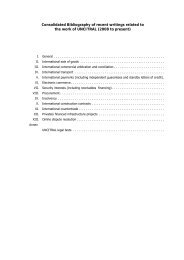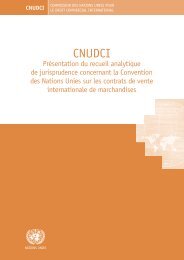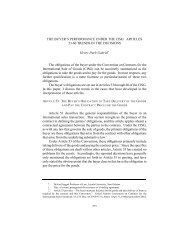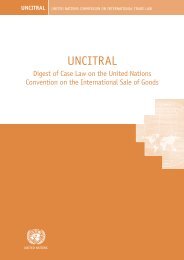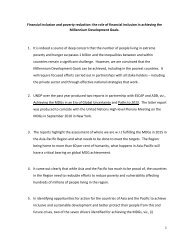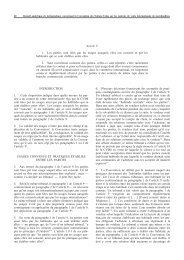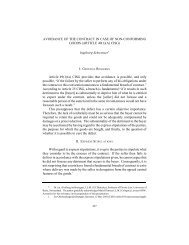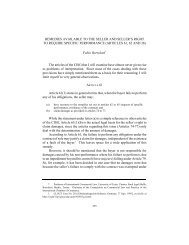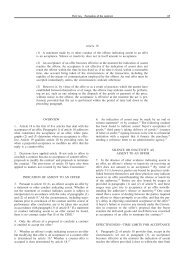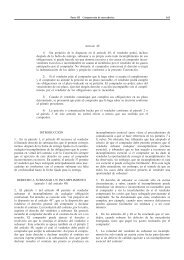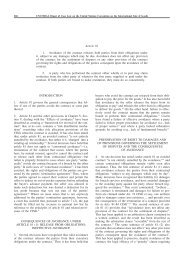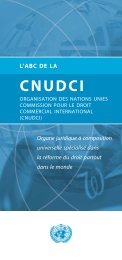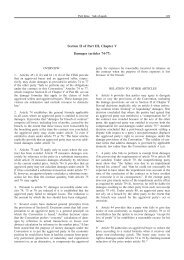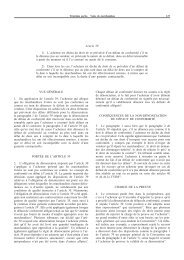THE SCOPE OF THE CONVENTION: REACHING OUT ... - UNCITRAL
THE SCOPE OF THE CONVENTION: REACHING OUT ... - UNCITRAL
THE SCOPE OF THE CONVENTION: REACHING OUT ... - UNCITRAL
You also want an ePaper? Increase the reach of your titles
YUMPU automatically turns print PDFs into web optimized ePapers that Google loves.
<strong>THE</strong> <strong>SCOPE</strong> <strong>OF</strong> <strong>THE</strong> <strong>CONVENTION</strong>: <strong>REACHING</strong> <strong>OUT</strong> TO<br />
ARTICLE ONE AND BEYOND<br />
Jacob Ziegel *<br />
INTRODUCTION<br />
This article consists of two parts. Part A provides an analysis of the<br />
principal components of Article 1 of the Convention on Contracts for the<br />
International Sale of Goods (CISG), 1 with particular emphasis on some of the<br />
ongoing challenges. Part B is sociological in character. It asks why there are<br />
so few reported CISG cases in common law jurisdictions and why, in those<br />
jurisdictions, the Convention provisions are often inadequately discussed, or<br />
ignored altogether, in the cases where the Convention is relevant. Part B is a<br />
logical corollary to Part A because the CISG will not serve its intended<br />
purpose as a unifying force in international trade unless it is accepted as a full<br />
partner in the domestic legal systems in the states that have adopted the<br />
Convention.<br />
PART A: ARTICLE 1 ISSUES<br />
To trigger the Convention it must be shown that the transaction involves<br />
(1) a contract, (2) of sale, (3) of goods, (4) between parties (i) who are located<br />
in different Convention states, or (ii) where the rules of private international<br />
law governing the contract lead to a Convention state. Of these prerequisites,<br />
it is probably a fair assessment that requirement 4 is the one most litigated in<br />
practice.<br />
* Professor of Law Emeritus, University of Toronto, j.ziegel@utoronto.ca.<br />
1. United Nations Convention on Contracts for the International Sale of Goods, U.N. Doc.<br />
A/CONF.97/18, Annex 1 (Apr. 11, 1980) [hereinafter CISG]. CISG Article 1 provides:<br />
(1) This Convention applies to contracts of sale of goods between parties whose places of business<br />
are in different States: (a) when the States are Contracting States; or (b) when the rules of private<br />
international law lead to the application of the law of a Contracting State. (2) The fact that the<br />
parties have their places of business in different States is to be disregarded whenever this fact does<br />
not appear either from the contract or from any dealings between, or from information disclosed by,<br />
the parties at any time before or at the conclusion of the contract. (3) Neither the nationality of the<br />
parties nor the civil or commercial character of the parties or of the contract is to be taken into<br />
consideration in determining the application of this Convention.<br />
59
60 JOURNAL <strong>OF</strong> LAW AND COMMERCE [Vol. 25:59<br />
I. Nature of Transaction<br />
A. Contract of Sale<br />
Neither “contract” nor “sale” are defined in CISG. However, the basic<br />
ingredients of a contract—offer and acceptance—are common to all modern<br />
legal systems and are adequately identified in Part II of the Convention. 2 The<br />
term itself, as a prerequisite to the application of the CISG, does not seem to<br />
have given rise to significant difficulties.<br />
The meaning of “sale” is more problematic. The term is not defined in<br />
the CISG. It clearly involves a transfer of title in goods from a seller to a<br />
buyer since the whole purpose of the transaction is to provide the buyer with<br />
goods that he is free to use, consume or resell as his own. 3 More contentious<br />
is the issue of the extent to which the CISG applies to the seller’s retention of<br />
title under an installment sale (“conditional sale” in North American<br />
terminology) and the seller’s remedies on the buyer’s default under the<br />
contract after the buyer has received the goods. 4 It is commonly agreed that<br />
“sale” excludes a lease of goods, but it remains unclear (i) to what extent a<br />
tribunal is bound by the parties characterization of the contract as a lease, and<br />
(ii) (more speculatively) whether it is open to a tribunal to apply the CISG<br />
provisions by analogy to an international lease. 5<br />
There is also some difference of opinion regarding whether a barter<br />
agreement can under any circumstances qualify as a sale given that “price” is<br />
not defined in the CISG. 6 Here too the permissibility of a tribunal applying<br />
the CISG by analogy deserves further consideration.<br />
The characterization of distribution and franchising agreements also<br />
appears to be a source of some confusion. 7 The correct position appears to be<br />
that if the agreement merely entitles the distributor to order goods from the<br />
2. CISG arts. 14-24.<br />
3. CISG arts. 41-42.<br />
4. See Jacob Ziegel, Comment on Roder Zelt- und Hallenskonstruktionen GmbH v. Rosedown Park<br />
Pty. Ltd., in REVIEW <strong>OF</strong> <strong>THE</strong> <strong>CONVENTION</strong> ON CONTRACTS FOR <strong>THE</strong> INTERNATIONAL SALE <strong>OF</strong> GOODS (CISG)<br />
53 (1998).<br />
5. On the latter point, see JOHN HONNOLD, UNIFORM LAW FOR INTERNATIONAL SALES UNDER <strong>THE</strong><br />
1980 UNITED NATIONS <strong>CONVENTION</strong> § 60.4 (3d ed. 1999).<br />
6. Id. § 56.1. See also FRANCO FERRARI, <strong>THE</strong> UNIFICATION <strong>OF</strong> INTERNATIONAL COMMERCIAL LAW<br />
19-20 (1998); Peter Winship, in INTERNATIONAL SALES: <strong>THE</strong> UNITED NATIONS <strong>CONVENTION</strong> ON<br />
CONTRACTS FOR <strong>THE</strong> INTERNATIONAL SALE <strong>OF</strong> GOODS § 1.02 (Nina Galston & Hans Smit eds., 1980).<br />
7. Cf. HONNOLD, supra note 5, § 56.2.
2005-06] <strong>SCOPE</strong> <strong>OF</strong> <strong>THE</strong> <strong>CONVENTION</strong>: ARTICLE 1 61<br />
other party there is no sale agreement unless and until the distributor or<br />
franchisee actually places an order. 8<br />
B. Meaning of Goods (Marchandises)<br />
The key issue that has emerged here is whether a sale of computer<br />
“software” can qualify as a sale of goods. 9 The sale of a computer chip has<br />
been held to be a sale of goods 10 whereas, not surprisingly, a contract for the<br />
preparation of a research marketing report has not. 11 Professor Lookofsky has<br />
argued strongly for treating all sales of software as a sale of goods, 12 but this<br />
position is difficult to sustain where the software is not imbedded in a tangible<br />
thing at the time of sale, e.g., a disk or as part of a computer, cell phone, or<br />
other accessory or piece of equipment. Admittedly, it seems artificial to treat<br />
as a sale of goods software imbedded in a disk and to treat the transaction as<br />
the sale of an intangible where the software is transmitted electronically to the<br />
buyer, but the same observation could be made today about many other<br />
transactions where intellectual property can be made available to a buyer or<br />
licensee in several forms. If it is desirable to impose a single characterization,<br />
regardless of the form in which the software is made available to the buyer,<br />
then it is probably more logical to treat it as the sale of an intangible.<br />
Domestic sales law systems have also had to face the same<br />
characterization issue and also appear to be divided about the correct answer. 13<br />
8. See Viva Vino Import Corp. v. Farnese Vini S.r.l., No. CIV.A. 99-6384, 2000 WL 1224903, *1<br />
(E.D. Pa. Aug. 29, 2000); CL<strong>OUT</strong> Case No. 379 [Corte Suprema di Cassazione, Italy, 14 Dec. 1999]<br />
(Imperial Bathroom Co. v. Sanitari Pozzi S.p.a.), published in GIUSTIZIA CIVILE 2333-334 (2000), available<br />
at http://www.unilex.info/case.cfm?pid=1&do=case&id=390&step=FullText (Italian), English translation<br />
available at http://cisgw3.law.pace.edu/cases/991214i3.html.<br />
9. HONNOLD, supra note 5, § 56.<br />
10. CL<strong>OUT</strong> Case No. 131 [Landgericht München, Germany, 8 Feb. 1995], available at<br />
http://www.unilex.info/case.cfm?pid=1&do=case&id=225&step=FullText (German), English translation<br />
available at http://cisgw3.law.pace.edu/cases/950208g4.html.<br />
11. CL<strong>OUT</strong> Case No. 122 [Oberlandesgericht Köln, Germany, 26 Aug. 1994], available at<br />
http://www.unilex.info/case.cfm?pid=1&do=case&id=66&step=FullText (German), English translation<br />
available at http://cisgw3.law.pace.edu/cases/940826g1.html.<br />
12. Joseph Lookofsky, In Dubio Pro Conventione? Some Thoughts About Opt-Outs, Computer<br />
Programs and Preemption Under the 1980 Vienna Sales Convention, 13 DUKE J. COMP. & INT’L L. 263<br />
(2003).<br />
13. See, e.g., PATRICK S. ATIYAH, <strong>THE</strong> SALE <strong>OF</strong> GOODS 66-71 (10th ed. 2001), citing inter alia the<br />
contrasting decisions in Beta Computers (Europe) Ltd. v. Adobe Systems (Europe) Ltd., (1996) S.L.T 604<br />
(Sess.) (Scot.), and St. Albans City and District Council v. International Computers Ltd. [1996] 4 All E.R.<br />
481 (EWCA (Civ)) (Eng.). The editor’s conclusion is that “the key to the conundrum is not to get lost in<br />
metaphysical questions as to whether or not software is goods, but to focus on who is being sued in respect<br />
of what sort of defect, and to be clear as to the basis on which liability is being imposed.” Id. at 71.
62 JOURNAL <strong>OF</strong> LAW AND COMMERCE [Vol. 25:59<br />
Given this uncertainty and the historic meaning of goods, it seems best to<br />
continue to distinguish between a sale of software imbedded in a tangible<br />
thing and a sale not so imbedded and to hope for an early revision of the<br />
Convention so that this uncertainty (together with many others) can be<br />
definitively addressed.<br />
C. Meaning of “Parties”<br />
This too is an undefined term. However, Article 1(3) CISG makes it clear<br />
that the nationality of the parties or their civil or commercial character is<br />
irrelevant. 14 Does this mean that an order for goods placed by a government<br />
agency with a foreign seller will be governed by the CISG even though<br />
government contracts are regulated by a separate regime under the domestic<br />
law of the agency (Article 11 CISG clearly implies that government contracts<br />
were meant to be included)? 15 It is also open for consideration to what extent<br />
the CISG provisions apply to sales not made in the course of the seller’s<br />
business, e.g., the sale of used office furniture or redundant computers by a<br />
business enterprise or to sales made by an individual who is not a merchant at<br />
all, e.g., the sale of a family heirloom by the owner to a jeweler, since the<br />
Convention does not distinguish between merchant sellers and non-merchant<br />
sellers. A literal application of some of the CISG provisions to a private sale<br />
(e.g., with respect to the fitness of the goods or the seller’s liability for all<br />
reasonably foreseeable damages under Article 74 in case of breach) could lead<br />
to untoward results.<br />
D. Location of Parties (Articles 1(1)(a) and 10) 16<br />
Determining the correct location of the parties is a recurring issue since<br />
Article 1(1)(a) will not be triggered unless both parties had their places of<br />
business in different Convention states at the material time and the location<br />
14. See text of CISG art. 1, supra note 1.<br />
15. CISG Article 11 provides: “A contract of sale need not be concluded in or evidenced by writing<br />
and is not subject to any other requirement as to form. It may be proved by any means, including<br />
witnesses.”<br />
16. For the text of Article 1(a), see supra note 1. CISG Article 10 provides:<br />
For the purposes of this Convention: (a) if a party has more than one place of business, the place<br />
of business is that which has the closest relationship to the contract and its performance, having<br />
regard to the circumstances known to or contemplated by the parties at any time before or at the<br />
conclusion of the contract; (b) if a party does not have a place of business, reference is to be made<br />
to his habitual residence.
2005-06] <strong>SCOPE</strong> <strong>OF</strong> <strong>THE</strong> <strong>CONVENTION</strong>: ARTICLE 1 63<br />
was known by or disclosed to the other party prior to the contract. 17 Article<br />
10 clarifies the position where a party has more than one place of business but<br />
difficulties may still arise in complex corporate structures where several<br />
divisions of a group may be involved in the negotiation or performance of a<br />
contract. 18<br />
Difficulties may also arise in electronically concluded contracts where the<br />
parties’ physical location may not be disclosed, or not be adequately<br />
disclosed, in the exchange of email documents. The draft <strong>UNCITRAL</strong><br />
Convention on the Use of Electronic Communications has some provisions on<br />
the point but it is doubtful whether they go far enough. 19<br />
The relevance of the location of an agent acting for one or other of the<br />
parties to the contract in determining whether Article 1(1)(a) has been<br />
satisfied or negated has also been raised several times. The clear answer<br />
appears to be that the agent’s location is irrelevant, even if the agent was<br />
involved in the contract negotiations, unless (arguably) the agent was actually<br />
authorized to conclude the contract on his own initiative. 20 The distinction<br />
revolves around the fact that if the agent merely serves as a conduit pipe he<br />
has no power to bind the principal and cannot be treated as a branch of the<br />
principal’s business. However, if the agent has authority to bind the principal,<br />
the other party should be entitled to treat the agent as an intrinsic part of the<br />
principal’s business operation.<br />
Finally, difficulties may arise in satisfying the Article 1(1) requirements<br />
in multipartite contracts where some of the parties are located in different<br />
17. See Impuls I.D. Internacional, S.L. v. Psion-Teklogix, Inc., 234 F. Supp. 2d 1267 (S.D. Fla.<br />
2002), available at http://cisgw3.law.pace.edu/cases/021122ul.html.<br />
18. Cf. Asante Technologies Inc. v. PMC-Sierra, Inc., 164 F. Supp. 2d 1142 (N.D. Cal. 2001),<br />
available at http://cisgw3.law.pace.edu/cases/01072701.html. For the text of Article 10, see supra note<br />
16.<br />
19. See Draft Convention on the Use of Electronic Communications in International Contracts, U.N.<br />
Commission on International Trade Law, 38th Sess., U.N. Doc. A/CN.9/577 (2005), available at<br />
http://www.uncitral.org/uncitral/en/commission/sessions/38th.html. I am indebted to John Gregory, senior<br />
counsel, Ministry of the Attorney General, Toronto, for providing me with this information. Mr. Gregory<br />
served as a Canadian representative in the drafting of the Convention. Article 1 of the draft Convention<br />
dealing with “scope of application” reads:<br />
This Convention applies to the use of electronic communications in connection with the<br />
[negotiation] [formation] or performance of a contract between parties whose places of business are<br />
in different States: (a) When the States are Contracting States; (b) When the rules of private<br />
international law lead to the application of the law of a Contracting State; or (c) When the parties<br />
have agreed that it applies.<br />
Id.<br />
20. See Asante, 164 F. Supp. 2d 1142; Oberlandesgericht Köln, Germany, 13 Nov. 2000, available<br />
at http://cisgw3.law.pace.edu/cases/001113gl.html.
64 JOURNAL <strong>OF</strong> LAW AND COMMERCE [Vol. 25:59<br />
contracting states and others are located in non-convention states. 21 This<br />
appears to be one of many situations where Article 1(1)(b) serves a<br />
particularly useful function in overcoming the rigidities of the Article 1(1)(a)<br />
requirement by accepting the sufficiency of a Convention state identified as<br />
the proper law of the parties’ contract. It is also open for consideration<br />
whether the problems of multipartite contracts should be specifically<br />
addressed in future amendments of the CISG.<br />
E. Role of Article 1(1)(b) and Effect of Article 95 Reservation 22<br />
As previously indicated, Article 1(1)(b) plays a key role in expanding the<br />
scope of the CISG where the contracting parties are not located in different<br />
Convention states or one of them is not located in a Convention state.<br />
Difficulties may arise in determining the proper law of the contract where the<br />
contract does not contain an express choice of law clause given the diverse<br />
convention regimes governing the determination of the proper law of a<br />
contract and different codal and common law rules at the domestic level.<br />
Happily, judging by the reported cases, this has not emerged as a major<br />
problem. One reason may be that standard form contracts prepared by<br />
enterprises engaged in the export trade frequently contain a choice of law<br />
clause. Suppose there is such a choice of law clause in favour of the law of<br />
the exporter’s country, a Convention state, and that the buyer’s place of<br />
business is also situated in a Convention state. Given the strong presumption<br />
that a choice of law clause designating the law of a Convention state is meant<br />
to refer to the whole law of the Convention state and not just its domestic law,<br />
the courts of the Convention states will have two reasons to apply the CISG:<br />
(a) because Article 1(1)(a) applies, and (b) because the parties have expressly<br />
selected the law of a Convention state to govern their contract. 23<br />
1. Impact of Article 95 Reservation<br />
Article 95 entitles a state to declare at the time of its adherence that it will<br />
not be bound by Article 1(1)(b). Fortunately, only five countries have so far<br />
21. See Impuls, 234 F. Supp. 2d 1267.<br />
22. CISG Article 95 provides: “Any State may declare at the time of the deposit of its instrument<br />
of ratification, acceptance, approval or accession that it will not be bound by subparagraph (1)(b) of article<br />
1 of this Convention.”<br />
23. Cf. Ajax Tool Works, Inc. v. Can-Eng. Mfg. Ltd., No. 01 C 5938, 2003 WL 223186, *1 (N.D.<br />
Ill. Jan. 30, 2003), available at http://www.unilex.info/case.cfm?pid=1&do=case&id=834&step=FullText.
2005-06] <strong>SCOPE</strong> <strong>OF</strong> <strong>THE</strong> <strong>CONVENTION</strong>: ARTICLE 1 65<br />
invoked the reservation—the United States, China, Singapore, the Czech<br />
Republic and Slovakia (Germany has also adopted a limited version of Article<br />
95 24 ). Nevertheless, two of the Article 95 reservation states (China and the<br />
United States) are very big guns indeed, so the impact of their reservations<br />
under Article 95 cannot be ignored.<br />
Text writers have wrestled with the correct answers to the many<br />
permutations that can arise theoretically, both under Article 95 and under the<br />
reservations in Articles 91 to 94. 25 It seems clear that, if the issue arises in a<br />
24. Vom 11. April 1980 (BGBI. 1989 II S. 588), Artikel 95. For the text of Article 95, see supra<br />
note 22.<br />
25. See, e.g., HONNOLD, supra note 5, § 46-47.5; FERRARI, supra note 6, at 15-17; Isaak I. Dore,<br />
Choice of Law Under the International Sales Convention: A U.S. Perspective, 77 AM. J. INT’L. L. 521<br />
(1983). CISG Article 91 provides:<br />
(1) This Convention is open for signature at the concluding meeting of the United Nations<br />
Conference on Contracts for the International Sale of Goods and will remain open for signature by<br />
all States at the Headquarters of the United Nations, New York until 30 September 1981. (2) This<br />
Convention is subject to ratification, acceptance or approval by the signatory States. (3) This<br />
Convention is open for accession by all States which are not signatory States as from the date it is<br />
open for signature.<br />
CISG Article 92 provides:<br />
(1) A Contracting State may declare at the time of signature, ratification, acceptance, approval or<br />
accession that it will not be bound by Part II of this Convention or that it will not be bound by Part<br />
III of this Convention. (2) A Contracting State which makes a declaration in accordance with the<br />
preceding paragraph in respect of Part II or Part III of this Convention is not to be considered a<br />
Contracting State within paragraph (1) of article 1 of this Convention in respect of matters governed<br />
by the Part to which the declaration applies.<br />
CISG Article 93 provides:<br />
(1) If a Contracting State has two or more territorial units in which, according to its constitution,<br />
different systems of law are applicable in relation to the matters dealt with in this Convention, it<br />
may, at the time of signature, ratification, acceptance, approval or accession, declare that this<br />
Convention is to extend to all its territorial units or only to one or more of them, and may amend<br />
its declaration by submitting another declaration at any time. (2) These declarations are to be<br />
notified to the depositary and are to state expressly the territorial units to which the Convention<br />
extends. (3) If, by virtue of a declaration under this article, this Convention extends to one or more<br />
but not all of the territorial units of a Contracting State, and if the place of business of a party is<br />
located in that State, this place of business, for the purposes of this Convention, is considered not<br />
to be in a Contracting State, unless it is in a territorial unit to which the Convention extends. (4)<br />
If a Contracting State makes no declaration under paragraph (1) of this article, the Convention is<br />
to extend to all territorial units of that State.<br />
CISG Article 94 provides:<br />
(1) Two or more Contracting States which have the same or closely related legal rules on matters<br />
governed by this Convention may at any time declare that the Convention is not to apply to<br />
contracts of sale or to their formation where the parties have their places of business in those States.<br />
Such declarations may be made jointly or by reciprocal unilateral declarations. (2) A Contracting<br />
State which has the same or closely related legal rules on matters governed by this Convention as<br />
one or more non-Contracting States may at any time declare that the Convention is not to apply to<br />
contracts of sale or to their formation where the parties have their places of business in those States.
66 JOURNAL <strong>OF</strong> LAW AND COMMERCE [Vol. 25:59<br />
contracting state (A) that has made an Article 95 declaration and that is also<br />
the proper law of the contract under A’s conflict rules, A’s courts will ignore<br />
the Convention entirely in dealing with the parties’ contractual disputes. 26<br />
Does it make a difference if the contracting parties have adopted a choice of<br />
law clause designating A’s law as the law of the contract? Should the parties’<br />
language be interpreted to mean that they want their relationship to be<br />
governed by the CISG even though state A has excluded the CISG as a result<br />
of its Article 95 reservation? In Asante Technologies 27 the federal district<br />
court in California held that the Convention applied to determine the parties’<br />
dispute. It did so because, in the court’s opinion, the choice of California law<br />
in the buyer’s order triggered the CISG given that the U.S. government’s<br />
ratification of the CISG also made the CISG part of the state’s law.<br />
Unfortunately, the court overlooked the effect of the U.S. government’s<br />
reservation under Article 95. This error was avoided in another federal court<br />
decision, that in Impuls Internacional, 28 though without referring to Asante.<br />
Since there is nothing that precludes the parties from excluding the CISG from<br />
their contract where it would otherwise apply, presumably it is also possible<br />
for the parties to adopt the CISG even though it has been excluded by the<br />
Convention state governing the parties’ contract through an Article 95<br />
reservation. Regrettably, neither Asante nor Impuls considered what<br />
contractual language would be required to show that this was the parties’<br />
intention.<br />
In both the cases just mentioned, the United States was also the forum<br />
state. Consider the effect of an Article 95 reservation by a state (state C)<br />
whose law is also the proper law of the contract where the case is heard in<br />
forum state A that has adopted the CISG without an Article 95 reservation.<br />
The commentators appear generally to agree that state A’s courts should<br />
respect state C’s Article 95 reservation regardless of whether state A has made<br />
the same declaration or not. This seems a correct result both on principle and<br />
because otherwise, as Professor Honnold has noted, the results of particular<br />
litigation involving state C’s reservation will depend on the accident of<br />
whether or not state A has made an Article 95 reservation.<br />
(3) If a State which is the object of a declaration under the preceding paragraph subsequently<br />
becomes a Contracting State, the declaration made will, as from the date on which the Convention<br />
enters into force in respect of the new Contracting State, have the effect of a declaration made under<br />
paragraph (1), provided that the new Contracting State joins in such declaration or makes a<br />
reciprocal unilateral declaration.<br />
26. See Impuls, 234 F. Supp. 2d 1267.<br />
27. Asante, 164 F. Supp. 2d 1142.<br />
28. Impuls, 234 F. Supp. 2d 1267.
2005-06] <strong>SCOPE</strong> <strong>OF</strong> <strong>THE</strong> <strong>CONVENTION</strong>: ARTICLE 1 67<br />
PART B: <strong>THE</strong> SOCIOLOGICAL QUESTION: WHY ARE <strong>THE</strong>RE SO FEW CISG<br />
CASES IN COMMON LAW JURISDICTIONS?<br />
The fact that 63 countries have so far adopted the CISG is a very<br />
encouraging sign of the importance which states attach to the Convention as<br />
a legal vehicle for regulating international sales. However, the number of<br />
Convention states tells us little about the importance of the CISG in<br />
practice—how it actually influences the drafting of international contracts and<br />
the resolution of disputes where disagreements arise in the performance of a<br />
contract. Nor does it tell us anything about the influence of the Convention<br />
on legal education in the CISG states and on the attitude of judges and legal<br />
practitioners. Assessing the CISG’s impact on the strength of these criteria<br />
would involve complex studies, which appear not to have been made so far. 29<br />
In the absence of such studies we must look for proxies. The number and<br />
types of arbitral awards and court cases seem to serve this purpose well,<br />
though, outside China and Russia, most arbitral awards seem not to be<br />
reported and the comprehensiveness of reporting of court cases varies widely<br />
among the CISG member states. Table 1, below, tells part of the story:<br />
29. A modest, but nevertheless significant exception, from a U.S. perspective, appears in Michael<br />
W. Gordon, Some Thoughts on the Receptiveness of Contract Rules in the CISG and UNIDROIT Principles<br />
as Reflected in One State’s (Florida) Experience of (1) Law School Faculty, (2) Members of the Bar with<br />
an International Practice, and (3) Judges, 46 AM. J. COMP. L. 361 (1998). Note also that the <strong>UNCITRAL</strong><br />
Secretariat is about to launch a questionnaire enquiry to determine why so many contracting parties exclude<br />
the CISG in their choice of law provisions.
68 JOURNAL <strong>OF</strong> LAW AND COMMERCE [Vol. 25:59<br />
Table 1<br />
Distribution of CISG Cases by Selected Countries 30<br />
1988-1998 2000-2005<br />
Civil Law Jurisdictions<br />
1. Germany 209 (36.8% of total) 91 (23% of total)<br />
2. Netherlands 91 23<br />
3. Switzerland 65 27<br />
4. Austria 39 28<br />
5. France 30 29<br />
6. Belgium 27 67<br />
7. Spain 8 31<br />
Common Law Jurisdictions<br />
1. USA 18 27 cases, 38<br />
decisions<br />
2. Australia 2 7 decisions<br />
3. Canada 1 7 decisions<br />
4. New Zealand 0 6 decisions<br />
Between 1988 and 1998, there were 108 reported arbitral awards and 568<br />
court cases for all Convention states for a total of 676 decisions. As of<br />
January 2005, the excellent Pace Law School CISG website listed 1400<br />
decisions; Albert Kritzer recently advised the author that the current number<br />
of reported decisions is around 1600. (A large number of the additional cases<br />
are made up of arbitral awards from China.) Table 1, above, shows the<br />
30. MICHAEL R. WILL, TWENTY YEARS <strong>OF</strong> INTERNATIONAL SALES LAW UNDER <strong>THE</strong> CISG:<br />
INTERNATIONAL BIBLIOGRAPHY AND CASE LAW DIGEST (1980-2000) (2000); Pace University Law School,<br />
Yearbook of CISG Cases: 2000-2005, available at http://www.cisg.law.pace.edu/cisg/text/YB2005-<br />
2000.html.
2005-06] <strong>SCOPE</strong> <strong>OF</strong> <strong>THE</strong> <strong>CONVENTION</strong>: ARTICLE 1 69<br />
distribution of CISG cases among selected civil law and common law<br />
jurisdictions. In the period 1988-1998, Germany easily led the list and<br />
accounted for 36.8% of the total number of cases; the Netherlands,<br />
Switzerland and Austria stood respectively in second, third and fourth place.<br />
In the period 2000-2005, Germany still led the field with 91 cases (23% of the<br />
total) but Belgium jumped from sixth place in the 1988-1998 period to second<br />
place in the 2000-2005 period. The number of Spanish cases also nearly<br />
quadrupled from 8 in the first period to 31 in the second period.<br />
The number of common law cases pales by comparison with those from<br />
civil law jurisdictions. In the first ten year period following the coming into<br />
effect of the CISG, Professor Will was only able to locate 21 cases altogether<br />
from the United States, Australia, Canada and New Zealand. In the<br />
2000-2005 period, the number of cases grew to 47, which suggests an<br />
increasing awareness by lawyers and courts in common law jurisdictions of<br />
the relevance of the CISG in international sales litigation. Nevertheless, even<br />
in this more favourable environment, the number of common law cases still<br />
accounted for less than 10 percent of the total number of reported cases and<br />
arbitral awards for all CISG countries. Still more troubling is the complaint<br />
by many common law authors 31 that even where the CISG clearly applies to<br />
a dispute, the Convention provisions are often not cited or are only partly<br />
cited, and that frequently the common law courts cite the domestic sales<br />
provisions together with the CISG provisions without appreciating the<br />
inappropriateness of doing so. Another recurring complaint among authors<br />
is that too often the common law courts have ignored the wealth of CISG<br />
literature and CISG case law. Happily, the position has improved, in some<br />
cases very significantly, in all these respects over the past five years. 32<br />
31. See, e.g., Rod N. Andreason, MCC-Marble Ceramic Center: The Parol Evidence Rule and<br />
Other Domestic Law Under the Convention on Contracts for the International Sale of Goods, BYU L.<br />
REV. 351, 352 (1999); Monica Kilian, CISG and the Problem with Common Law Jurisdictions, 10 FLA.<br />
ST. J. TRANSNAT’L L. & POL’Y 217 (2001), available at http://www.law.fsu.edu/journals/<br />
transnational/vol102/kilian.pdf; Karen B. Giannuzzi, The Convention on Contracts for the International<br />
Sale of Goods: Temporarily Out of “Service”?, 28 LAW & POL’Y INT’L BUS. 991 (1997); Albert Kritzer,<br />
The Convention on Contracts for the International Sale of Goods: Scope, Interpretation and Resources,<br />
in CORNELL REVIEW <strong>OF</strong> <strong>THE</strong> <strong>CONVENTION</strong> ON CONTRACTS FOR <strong>THE</strong> INTERNATIONAL SALE <strong>OF</strong> GOODS 147<br />
(Cornell Int’l Law Journal ed., 1995); Bruno Zeller, The CISG—Getting off the Fence, 74(9) L. INST. J. 73<br />
(2000); Jacob Ziegel, Canada’s First Decision on the International Sales Convention, 32 CAN. BUS. L.J.<br />
313 (1999).<br />
32. For a striking improvement, see the U.S. District Court’s judgment in Asante, supra note 19,<br />
and the high profile to the CISG provisions and literature in Zapata Hermanos v. Hearthside Baking Co.,<br />
313 F.3d 385 (7th Cir. 2002) (U.S.). See in particular the U.S. Solicitor General’s Amicus Curiae’s Brief<br />
in the Zapata certiorari petition to the U.S. Supreme Court, available at http://cisgw3.law.pace.edu/
70 JOURNAL <strong>OF</strong> LAW AND COMMERCE [Vol. 25:59<br />
I. Suggested Answer to Questions 33<br />
In the writer’s opinion, the paucity or frequency of CISG based litigation<br />
in civil law jurisdictions and common law states can be ascribed to one or<br />
more of the following factors: (i) cultural factors; (ii) economic factors; and<br />
(iii) legal factors endemic to the Convention. I am sure other CISG<br />
commentators can readily add to this list.<br />
A. Cultural Factors<br />
The importance of cultural factors was brought home to this writer when<br />
he emailed a long query at the beginning of September 2000 to the subscribers<br />
to the University of Freiburg CISG website asking them to explain the<br />
disproportionate number of German CISG cases. Without exception, all the<br />
respondents (7) 34 stressed the fact that the Convention was much better known<br />
in Germany than it was in North America. One or more respondents pointed<br />
to the important role that German scholars (particularly Ernst Rabel) had<br />
played in the evolution of the international sales conventions, to the fact that<br />
German courts had already developed a substantial corpus of case law on the<br />
ULIS while Germany was an adherent to the Hague Conventions, and that<br />
there was a vast body of CISG literature in German, including at least ten<br />
texts. I was told that every German law student would be exposed to at least<br />
some discussion of the CISG during his law school career (as compared to the<br />
paucity of discussion of the Convention at most U.S. law schools) and that<br />
many graduate theses at German law schools were devoted to the Convention.<br />
So far as the U.S. position was concerned, Albert Kritzer, director of the<br />
excellent Pace University Law School CISG website, emphasized in his reply<br />
to me his own belief that lack of familiarity with the Convention was at the<br />
root of the paucity of U.S. cases. However, this observation needs to be<br />
cisg/biblio/zapata4.html. The New Zealand courts also seem to have done a better job of coming to grips<br />
with the CISG provisions and case law than their peers in Canada and Australia.<br />
33. The following passages borrow heavily from the author’s earlier article. Jacob Ziegel, The<br />
Future of the International Sales Convention from a Common Law Perspective, 6 N.Z. BUS. L.Q. 336<br />
(2000).<br />
34. Four of them were German, one was a young Belgian scholar, Patrick Wautelet of the University<br />
of Belgium, and at the time of his reply a BAEF fellow at the Harvard Law School. The sixth was a<br />
doctoral student in Dallas, and the seventh was a young Mexican lawyer who had studied the Convention<br />
at the University of Pittsburgh Law School. I exchanged several emails with Mr. Wautelet and his replies<br />
were particularly comprehensive and illuminating.
2005-06] <strong>SCOPE</strong> <strong>OF</strong> <strong>THE</strong> <strong>CONVENTION</strong>: ARTICLE 1 71<br />
qualified. There is no shortage of U.S. literature on the CISG; U.S. scholars 35<br />
played leading roles in the drafting of the CISG, and one of them wrote what<br />
is probably the best known commentary on the Convention. 36 I believe<br />
therefore we must also look to other factors to explain the shortage of U.S.<br />
case law and, for similar reasons, the paucity of reported decisions in most of<br />
the other common law jurisdictions that have adopted the Convention. 37<br />
B. Economic Factors<br />
Lawyers do not litigate for altruistic reasons. Even if they appreciate that<br />
the Convention applies to their sales transaction, they may have no incentive<br />
to plead the Convention unless they have reason to believe it will strengthen<br />
their claim or defence. Making that determination may not be easy for a<br />
variety of reasons. The main issue may turn on questions of fact (for example,<br />
whether or not the goods were defective) and the parties may not find it an<br />
economical use of scarce resources (their time and their clients’ money) to<br />
become familiar with a different body of law in case their expectations turn<br />
out to be wrong. The lawyers’ reluctance may be particularly strong if the<br />
amount involved is small (say, less than U.S. $50,000) and if neither counsel<br />
is often involved in international sales litigation. Even if counsel feel obliged<br />
to plead the CISG, constraints of time and resources may limit the amount of<br />
research they are willing to do, which explains why in so many of the U.S.<br />
cases there is little, if any, reference to earlier CISG case law and the abundant<br />
CISG literature, and even fewer citations to non-U.S. sources. It also explains<br />
why U.S. courts appear so ready to interpret the CISG provisions through<br />
common law lenses. 38<br />
35. Notably, John Honnold, who was the first director of <strong>UNCITRAL</strong> and a leading international<br />
sales law scholar long before he became involved with <strong>UNCITRAL</strong>, and E. Allan Farnsworth of the<br />
Columbia University Law School. Professor Farnsworth was a leading U.S. contract scholar and served<br />
for many years as the senior U.S. delegate to <strong>UNCITRAL</strong> and UNIDROIT. Unhappily, Professor<br />
Farnsworth passed away at the beginning of 2005.<br />
36. See HONNOLD, supra note 5.<br />
37. I would exclude New Zealand from the complaint given the fact that its courts produced six<br />
reported decisions (several of very high quality) between 2000 and 2005. This was only one decision less<br />
than the number of reported Australian judgments even though Australia’s population (20 million) is five<br />
times larger than New Zealand’s (4 million).<br />
38. These traits are also present in the two Canadian cases referred to earlier. In the Roder-Zelt case,<br />
supra note 4, Judge Van Doussa appears to have made a serious attempt to understand the concepts of<br />
avoidance and fundamental breach in the Convention but was handicapped in not having the relevant<br />
literature cited to him.
72 JOURNAL <strong>OF</strong> LAW AND COMMERCE [Vol. 25:59<br />
C. Legal Factors<br />
What I describe as legal factors come into play at two quite different<br />
levels. At one level, legal factors explain why the sales cases often do not<br />
refer to the CISG even though to the cognescenti the Convention clearly<br />
applied. This is because, where the parties are located in different states that<br />
have adopted the Convention, the Convention applies unless the parties have<br />
contracted out of it, and because the parties may have thought they had<br />
excluded the Convention when the language they used was inadequate to do<br />
so. At the second level, legal factors explain why, if they focus on the<br />
question at all, the contracting parties decide to exclude the Convention and<br />
do so successfully. The net result in both types of cases, at least in common<br />
law jurisdictions, is often the same: whether through misunderstanding or by<br />
calculation the case is not argued in court as a CISG case.<br />
Though CISG supporters may regard the exclusion of the Convention as<br />
antithetical to the development of a strong international law merchant, the<br />
parties may often have convincing reasons for the exclusion. The reasons are<br />
largely internal to the Convention itself. A far from exhaustive list of the<br />
reasons would include the following:<br />
• The CISG does not govern the validity of the contract or the property effects of the<br />
contract. The exclusion of validity issues, though based on sound considerations, is<br />
particularly serious both because the Convention does not define “validity” and<br />
because the German Supreme Court, with little hesitation, has held that the validity<br />
of a clause excluding the seller’s liability for damages falls outside the Convention.<br />
Limitation of liability clauses are so common in sales contracts that this feature alone<br />
seriously impairs the utility of the Convention.<br />
• The case law shows that a substantial number of issues are not dealt with at all in the<br />
CISG or are dealt with indequately. Particularly troublesome is Article 78’s failure<br />
to indicate how the rate of interest is to be determined where judgment is rendered in<br />
favour of the plaintiff.<br />
• Some of the formational rules in Part II of the CISG were already dated in 1980 39 and<br />
others have become so since then in the light of cybernetic developments.<br />
• The CISG contains no mechanism for updating its provisions and there is no<br />
international tribunal competent to resolve conflicting interpretations of important<br />
provisions.<br />
• The Convention allows for too many reservations (five) by adhering states. This<br />
imposes a heavy burden on the parties’ legal advisers to determine the parties’<br />
position in any of potentially several dozens countries in which their clients carry on<br />
business.<br />
39. See for example the CISG rules with respect to battle of the forms. See CISG art. 19(2).
2005-06] <strong>SCOPE</strong> <strong>OF</strong> <strong>THE</strong> <strong>CONVENTION</strong>: ARTICLE 1 73<br />
Given these weaknesses, the contracting parties may find it much more<br />
attractive to choose a municipal law with a well developed sales law to govern<br />
their contracts in place of the CISG. They will do so because it will provide<br />
greater certainty and because they hope the chosen domestic law will be able<br />
to resolve all future disputes between the parties, procedural as well as<br />
substantive.<br />
II. A More Optimistic Note<br />
I should like to think that the reasons I have offered for the paucity of<br />
CISG cases in common law jurisdictions are not static and that in the future<br />
both courts and litigants will become more CISG friendly. There are some<br />
strong incentives for them to become so. One is the steadily growing number<br />
of CISG adherents and the rapidly growing number of CISG decisions and<br />
reported arbitral awards, particularly those from the People’s Republic of<br />
China. A second reason is growing resistance to choice of law clauses<br />
excluding the CISG in contracts with the Western hemisphere’s new trading<br />
partners and the enormous influence on international trade being exerted by<br />
the Chinese colossus. Finally, and not least, the remarkable success of the<br />
annual Willem Vis International Moot Competition in Vienna has cultivated<br />
intense interest in the CISG and the Model <strong>UNCITRAL</strong> International<br />
Arbitration Law among law students from the more than 150 law schools that<br />
now participate in the competition. Many of the students hail from common<br />
law jurisdictions and they can be expected to be ambassadors of goodwill for<br />
the CISG and <strong>UNCITRAL</strong>’s other legislative efforts when they enter the ranks<br />
of legal professionals in their home jurisdictions.



